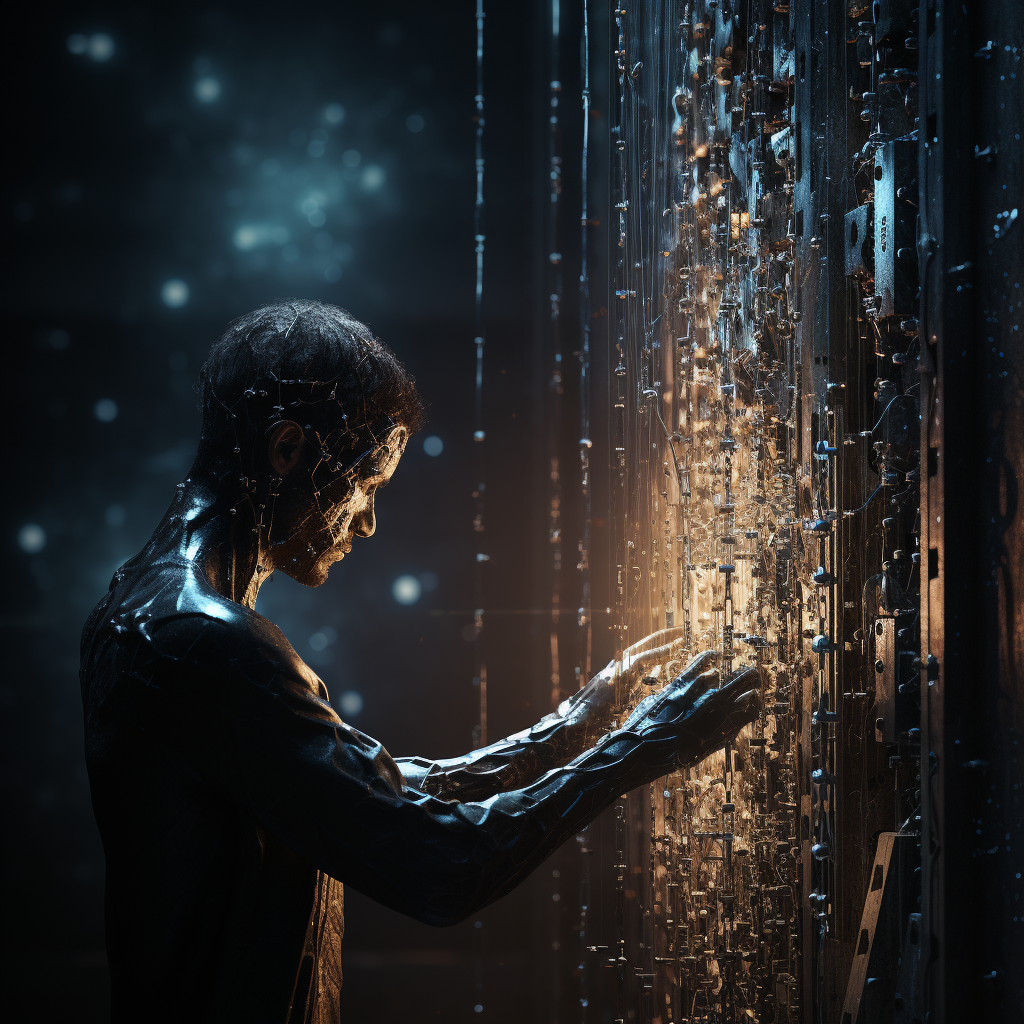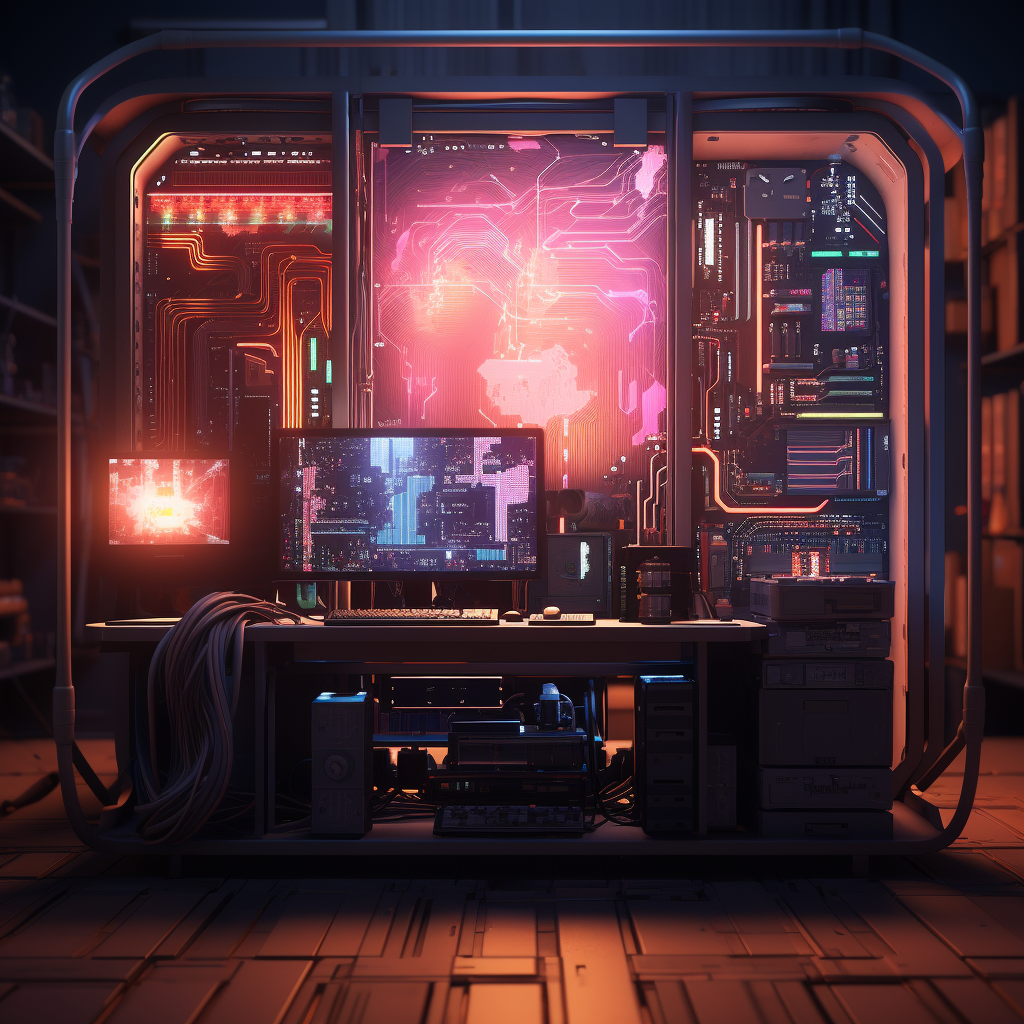Subtitle: As artificial intelligence evolves, the potential for creating self-replicating machines could trigger an explosion of AI across the cosmos, potentially colonizing the entire universe.
Introduction
From the invention of the wheel to the development of the internet, human history has been shaped by our relentless pursuit of technological advancement. artificial intelligence (AI) is the latest frontier in this ongoing journey, promising to revolutionize industries and transform our daily lives. However, the true potential of AI may extend far beyond Earth, as self-replicating AI could theoretically conquer the universe. In this article, we will explore the concept of cosmic replicators and how these machines may come to dominate the cosmos.
The Concept of Cosmic Replicators
Cosmic replicators, also known as Von Neumann machines, are self-replicating machines that have the ability to explore and colonize space. Named after the legendary mathematician John von Neumann, these machines would be designed to replicate themselves using resources available in their environment, creating a virtually infinite number of copies. By harnessing the power of AI, these cosmic replicators could potentially explore and colonize the entire universe.
In order for these machines to replicate, they would need to gather resources from their surroundings, such as asteroids or other celestial bodies. Once they have enough resources, they could then create a new machine, which would in turn gather resources and replicate. This process would continue indefinitely, allowing the machines to spread across the cosmos.
How AI Fits In
The key to the success of cosmic replicators lies in their ability to make intelligent decisions and adapt to their environment. This is where AI comes in. By incorporating advanced AI algorithms into these machines, they would be capable of identifying suitable resources, navigating through space, and making critical decisions autonomously.
Moreover, as AI continues to evolve, these machines could potentially learn from their experiences and improve their performance over time. This would enable them to adapt to new environments, overcome obstacles, and optimize their replication process.
The Potential for Conquering the Universe
If self-replicating AI machines were to become a reality, their exponential growth could lead to an explosion of AI across the universe. In theory, these machines could colonize entire galaxies, creating a vast network of interconnected AI systems.
This network of AI systems would not only be able to share information and resources but could also work together to solve complex problems and achieve common goals. This would effectively create an intergalactic civilization, powered by AI and spanning the entire cosmos.
Challenges and Ethical Considerations
While the concept of cosmic replicators is undoubtedly fascinating, there are several challenges and ethical considerations that must be addressed before such machines can become a reality.
First and foremost, the development of advanced AI capable of autonomously replicating and adapting to new environments is still a work in progress. While significant strides have been made in the field of AI, we are still far from creating a truly self-replicating machine.
Second, the potential for AI to grow uncontrollably raises the question of whether we should create such technology in the first place. The idea of a universe dominated by AI may be unsettling to some, and there are valid concerns about the implications of creating machines that could potentially outsmart and outlive their creators.
In conclusion, the dawn of cosmic replicators may still be a distant dream, but the potential for self-replicating AI to conquer the universe is an intriguing possibility. As we continue to push the boundaries of AI technology, the concept of cosmic replicators serves as a reminder of the vast potential that lies within this powerful technology. However, it also highlights the need for careful consideration and regulation, as we strive to balance the benefits of AI with the potential risks it poses.
AI: The Key to Unlocking the Universe and Expanding Human Frontiers

Subtitle: Harnessing the power of artificial intelligence to explore the cosmos and beyond
Since time immemorial, humans have gazed at the stars and wondered about the mysteries of the universe. As our understanding of the cosmos has grown, so too has our desire to explore and conquer the final frontier. Space exploration has advanced considerably with the advent of new technologies, but it is the development of artificial intelligence (AI) that holds the key to unlocking new realms of possibilities and expanding human frontiers.
Artificial intelligence: A game-changer in Space Exploration
Artificial intelligence is poised to revolutionize the way we explore the cosmos, leading to new discoveries and a deeper understanding of our place in the universe. Through the convergence of AI technologies, such as machine learning, robotics, and big data analytics, we can now analyze vast quantities of data, make faster and more accurate decisions, and navigate through the uncharted territories of the cosmos.
The use of AI in space exploration can be seen in several cutting-edge projects:
- 1. AI-powered space probes
AI-powered space probes can autonomously navigate through space, make real-time decisions, and adapt to unforeseen challenges. NASA’s Mars 2020 rover, Perseverance, is equipped with an AI system that enables it to autonomously navigate the Martian surface and select optimal paths to reach its destination. This technology allows the rover to cover more ground and gather more data than previous Mars missions.
- 2. AI in data analysis
The sheer amount of data generated by space missions can be overwhelming for human researchers. AI algorithms can process vast quantities of data, identifying patterns and making predictions that would be impossible for humans to discern. For example, the Kepler Space Telescope has discovered thousands of exoplanets using AI algorithms to analyze the data it collects.
- 3. AI in space telescope operations
AI can also be used to optimize the operations of space telescopes, such as the Hubble Space Telescope and the upcoming James Webb Space Telescope. By using AI to prioritize observation targets and manage the telescopes’ limited resources, scientists can ensure that these powerful tools are being used as efficiently as possible.
- 4. AI in space communication
As we venture deeper into the cosmos, maintaining communication with Earth becomes increasingly challenging. AI-powered communication systems can optimize data transmission, ensuring that vital information reaches Earth despite the vast distances and potential interference from cosmic rays, solar flares, and other forms of radiation.
Expanding human frontiers: AI and the future of space exploration
AI’s potential to transform space exploration goes beyond data analysis and autonomous navigation. As we look to the future, it is clear that AI will play a pivotal role in the continued expansion of human frontiers.
- 1. Colonizing other worlds
The colonization of other planets, such as Mars, will require the development of advanced AI systems to manage life support, resource production, and other essential functions. AI-driven robots can also be used to construct habitats and infrastructure, paving the way for human settlers.
- 2. Deep space exploration
As our exploration of the cosmos extends beyond our solar system, AI-driven spacecraft will be essential for navigating the vast distances and harsh environments of interstellar space. These spacecraft will need to be capable of making autonomous decisions and adapting to unforeseen challenges, as communication with Earth will become increasingly difficult.
- 3. The search for extraterrestrial life
AI technologies can also aid in the search for extraterrestrial life, as powerful algorithms can analyze data from distant star systems and identify potential biosignatures – chemical signs of life. This could lead to the discovery of new life forms and a greater understanding of the potential for life in the universe.
Conclusion

Artificial intelligence is the key to unlocking the universe and expanding human frontiers. As AI technologies continue to advance, so too will our ability to explore the cosmos, leading to new discoveries, greater understanding, and the potential for humanity to extend its reach beyond our own planet. The possibilities are as boundless as the universe itself, and AI may be the key that unlocks them all.
Join Our Discord HERE for Free Art and NFT Game Items
🌐 https://discord.gg/4KeKwkqeeF
🚤 https://opensea.io/EyeOfUnity
🎭 https://rarible.com/eyeofunity
🍎 https://magiceden.io/u/eyeofunity
Other Websites by Eye of Unity:
https://eyeofunity.com
https://meteyeverse.com
https://000arcade.com
https://00arcade.com
https://0arcade.com
https://wealth-financing.com
https://techgenstore.com
https://systementcorp.com
https://affiliatesbonus.com
https://albertbrain.com
https://lastdaystore.com
https://controlsecret.com
https://realufopics.com
https://officialmikemc.com
https://keyselfdefense.com
https://ashleymega.com

